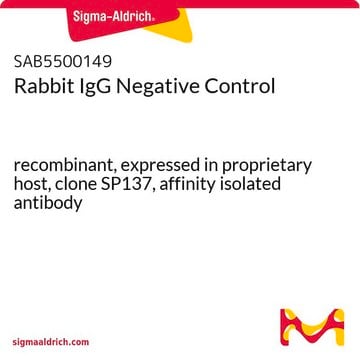17-10530
ChIPAb+ MED1 Antibody - ChIP Validated Antibody and Primer Set
from rabbit, purified by affinity chromatography
Synonym(s):
CRSP1 ChIP, CRSP1, TRAP220, MED1, TRIP-2, ARC205, Mediator of RNA polymerase II transcription subunit 1, Activator-recruited cofactor 205 kDa component, Mediator complex subunit 1, p53 regulatory protein RB18A, Peroxisome proliferator-activated receptor-binding prot, Chip Antibody and primer set, MED1 ChIP, TRIP-2 ChIP
About This Item
Recommended Products
biological source
rabbit
Quality Level
antibody form
affinity purified immunoglobulin
clone
polyclonal
purified by
affinity chromatography
species reactivity
human, mouse
manufacturer/tradename
ChIPAb+
Upstate®
technique(s)
ChIP: suitable
western blot: suitable
NCBI accession no.
UniProt accession no.
shipped in
dry ice
General description
The ChIPAb+ MED1 (CRSP1/TRAP220) set includes a MED1 antibody, a Normal Rabbit IgG, and positive control primers which amplify 85 bp of a human prostate-specific antigen (PSA) enhancer region. The MED1 antibody and negative control IgG are supplied in a scalable "per ChIP" reaction size and can be used to functionally validate the precipitation of MED1 associated chromatin.
Specificity
Immunogen
Application
Sonicated chromatin prepared from hormone starved (72H), then androgen agonist induced (1 µM CI-4AS-1 overnight) LNCaP cells (~1e6 cell equivalents per IP) were subjected to chromatin immunoprecipitation using 2 µg of either Normal Rabbit IgG (Part No. PP64B), or 2 µg Anti-MED1 (Part No.CS207349) and the Magna ChIP HiSens (Cat. # 17-10460). Successful immunoprecipitation of MED1 associated DNA fragments was verified by qPCR using ChIP Primers, PSA (Part No. CS207340) as a positive locus, and ChIP Primers, β-globin (Part No. CS200591) as a negative locus.
Please refer to the Magna ChIP HiSens (Cat. # 17-10460) or EZ-MagnaChIP HiSens(Cat. # 17-10461) protocol for experimental details.
Chromatin Immunoprecipitation:
Sonicated chromatin prepared from hormone starved (72H), then androgen agonist induced (1 µM CI-4AS-1 overnight) LNCaP cells (1e5 and 1e6 cell equivalents per IP) were subjected to chromatin immunoprecipitation using 2 µg of either Normal Rabbit IgG (Part No. PP64B), or 2 µg Anti-MED1 (Part No. CS207349) and the Magna ChIP HiSens Kit (Cat. # 17-10460). Successful immunoprecipitation of MED1 associated DNA fragments was verified by qPCR using ChIP Primers, PSA (Part No. CS207340).
Please refer to the MagnaChIP HiSens (Cat. # 17-10460) or EZ-MagnaChIP HiSens (Cat. # 17-10461) protocol for experimental details.
Western Blotting Analysis:
0.04 µg/mL of this antibody detected MED1 on 5, 15 and 50 µg of HeLa whole cell lysate.
Epigenetics & Nuclear Function
Transcription Factors
Packaging
Quality
Sonicated chromatin prepared from hormone starved (72h), then androgen agonist induced (1 µM CI-4AS-1 overnight) LNCaP cells (~1e6 cell equivalents per IP) were subjected to chromatin immunoprecipitation using 2 µg of either Normal Rabbit IgG (Part No. PP64B), or 2 µg Anti-MED1 (Part No.CS207349) and the Magna ChIP® HiSens Kit (Cat. # 17-10460). Successful immunoprecipitation of MED1 associated DNA fragments was verified by qPCR using ChIP Primers, PSA (Part No. CS207340).
Please refer to the MagnaChIP HiSens (Cat. # 17-10460) or EZ-MagnaChIP HiSens (Cat. # 17-10461) protocol for experimental details.
Target description
Physical form
Normal Rabbit IgG, Part No. PP64B. One vial containing 125 μg of purified Rabbit IgG in 125 μL storage buffer containing 0.05% sodium azide. Store at -20°C.
ChIP Primers, PSA. Part No. CS207340. One vial containing 75 μL of 5 μM of each primer specific for human prostate-specific antigen enhancer region (chr19:51354179-51354263, hg19 build). Store at -20°C.
FOR: GCC TGG ATC TGA GAG AGA TAT CAT C
REV: ACA CCT TTT TTT TTC TGG ATT GTT G
Storage and Stability
Analysis Note
Controls
Includes normal rabbit IgG and primers specific for a human prostate-specific antigen enhancer region.
Other Notes
Legal Information
Disclaimer
Storage Class Code
10 - Combustible liquids
Certificates of Analysis (COA)
Search for Certificates of Analysis (COA) by entering the products Lot/Batch Number. Lot and Batch Numbers can be found on a product’s label following the words ‘Lot’ or ‘Batch’.
Already Own This Product?
Find documentation for the products that you have recently purchased in the Document Library.
Our team of scientists has experience in all areas of research including Life Science, Material Science, Chemical Synthesis, Chromatography, Analytical and many others.
Contact Technical Service








